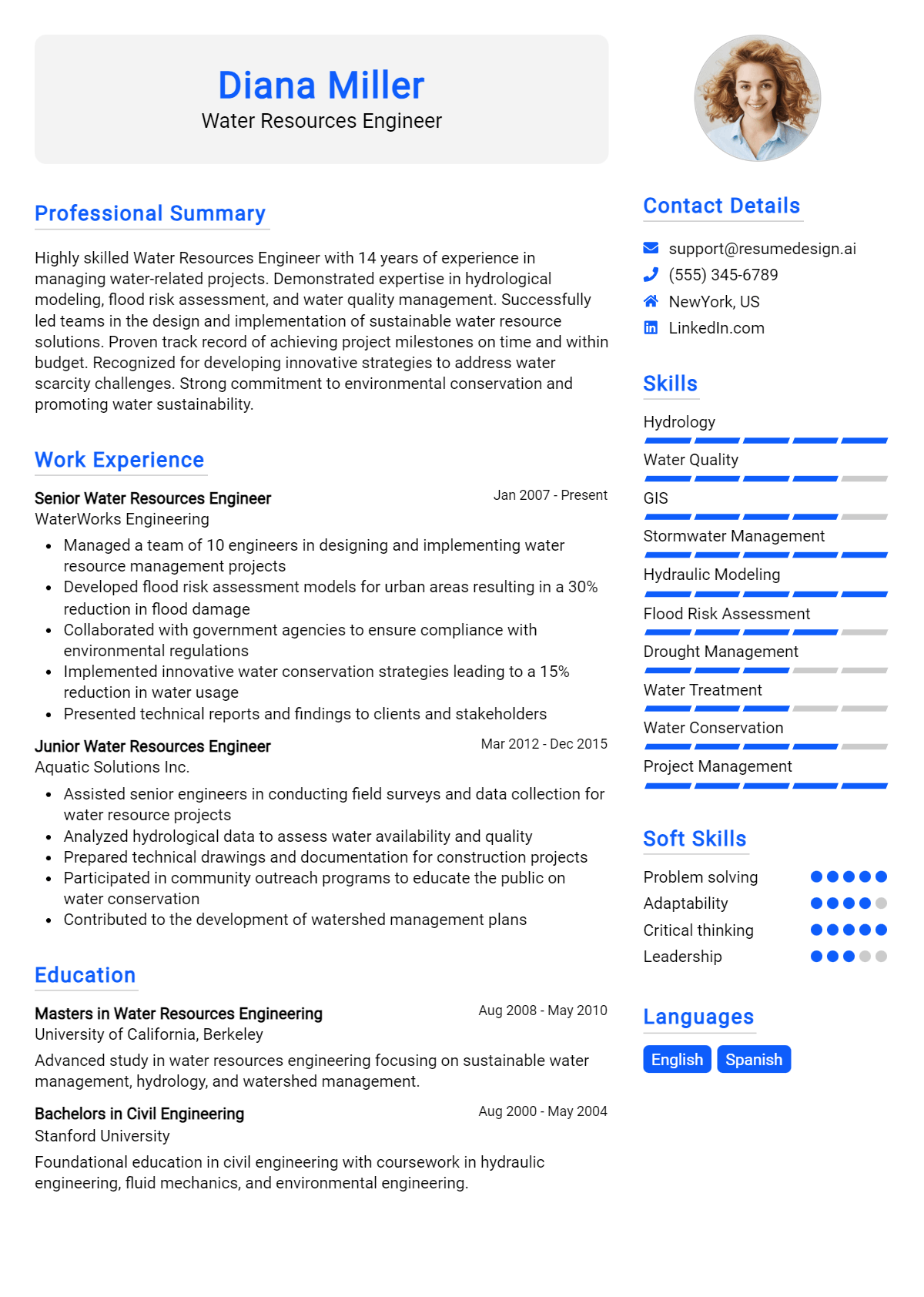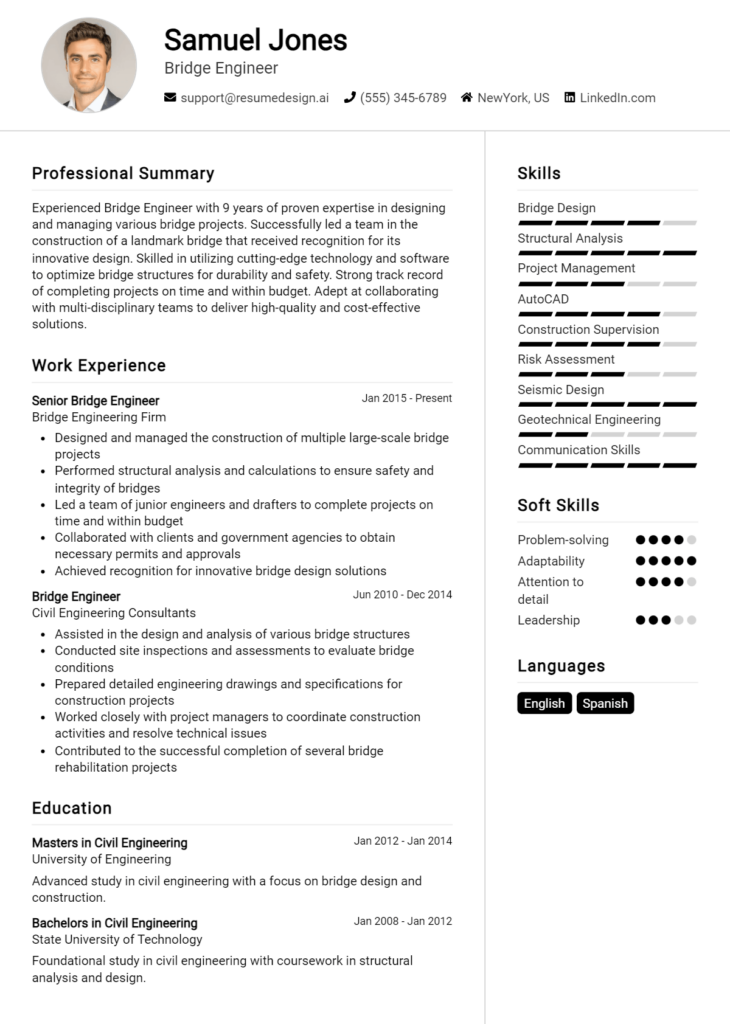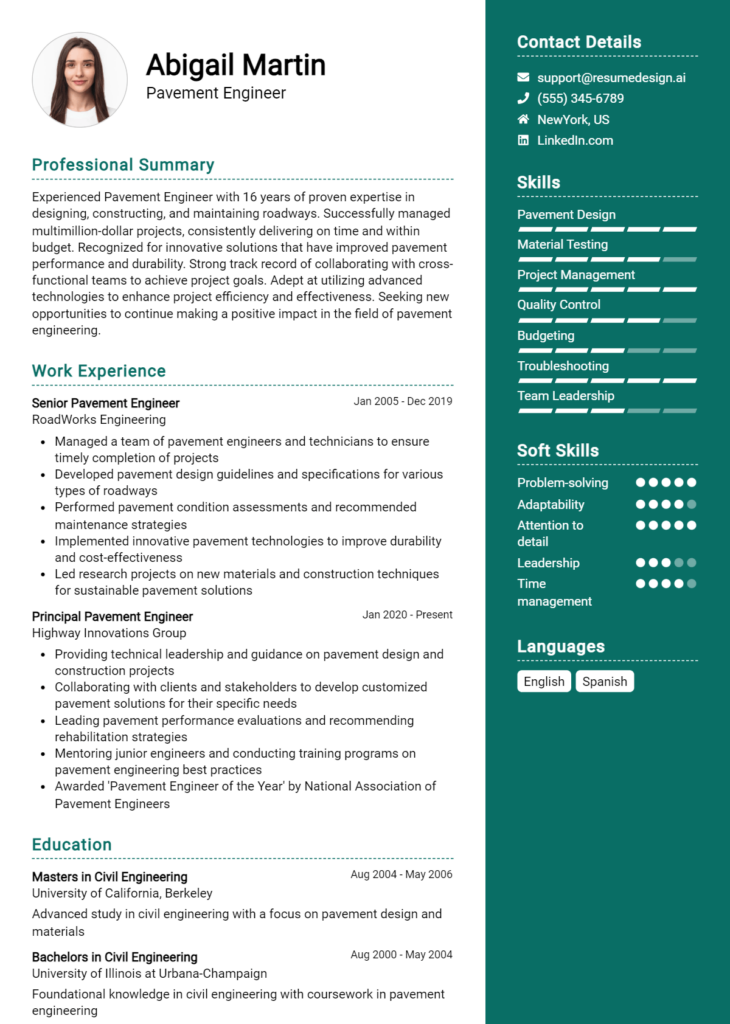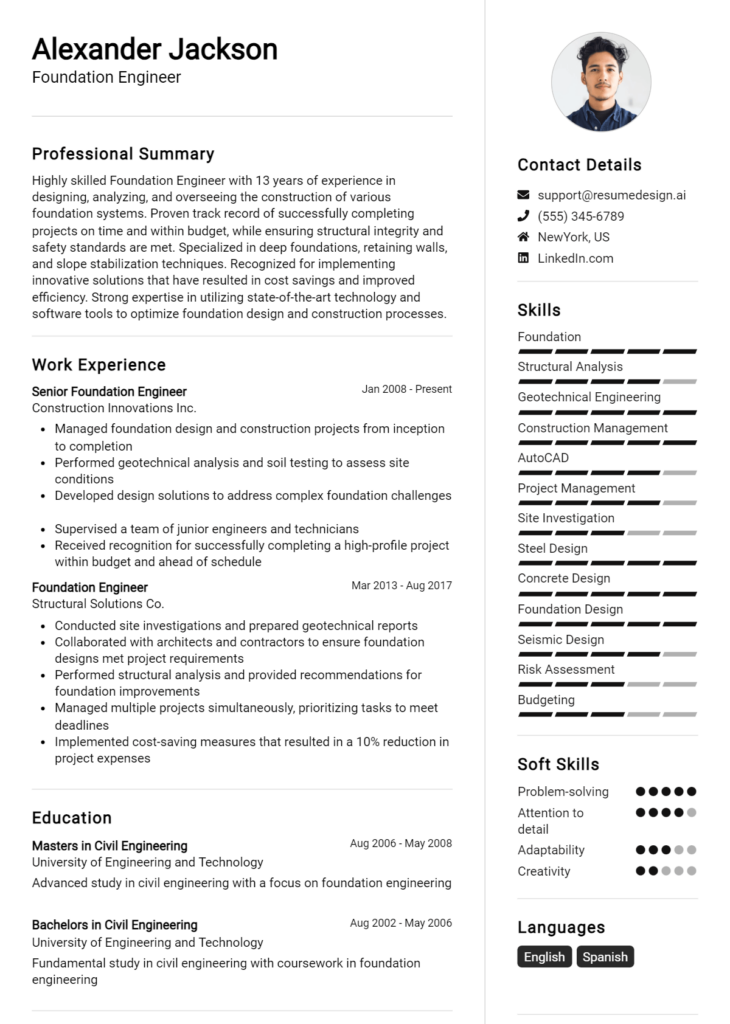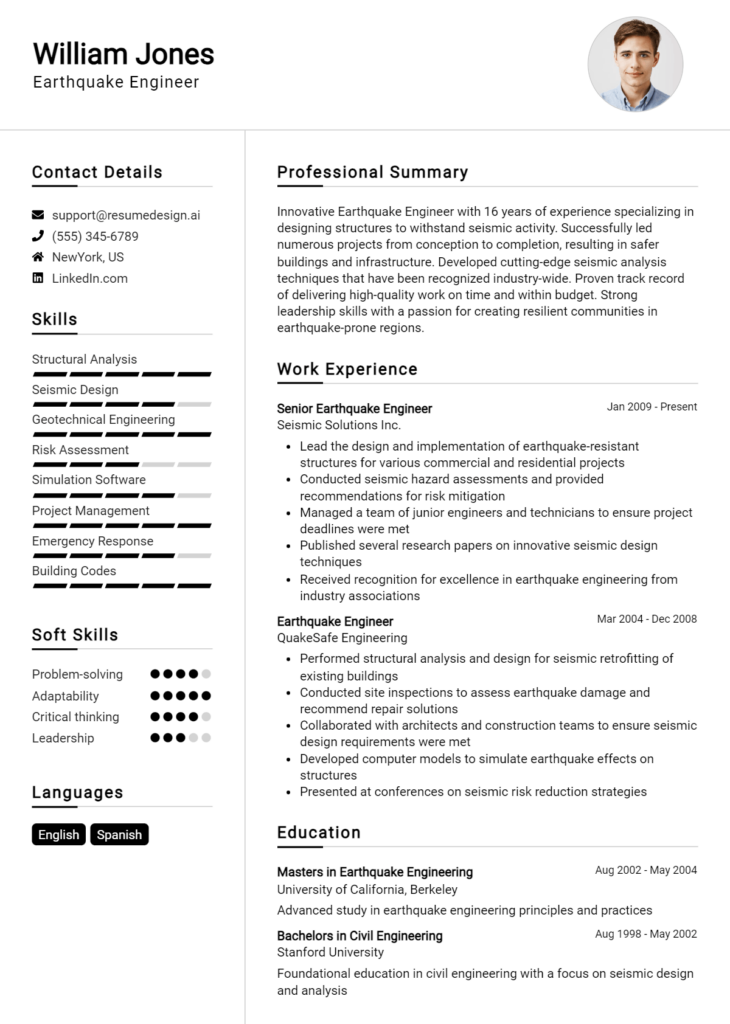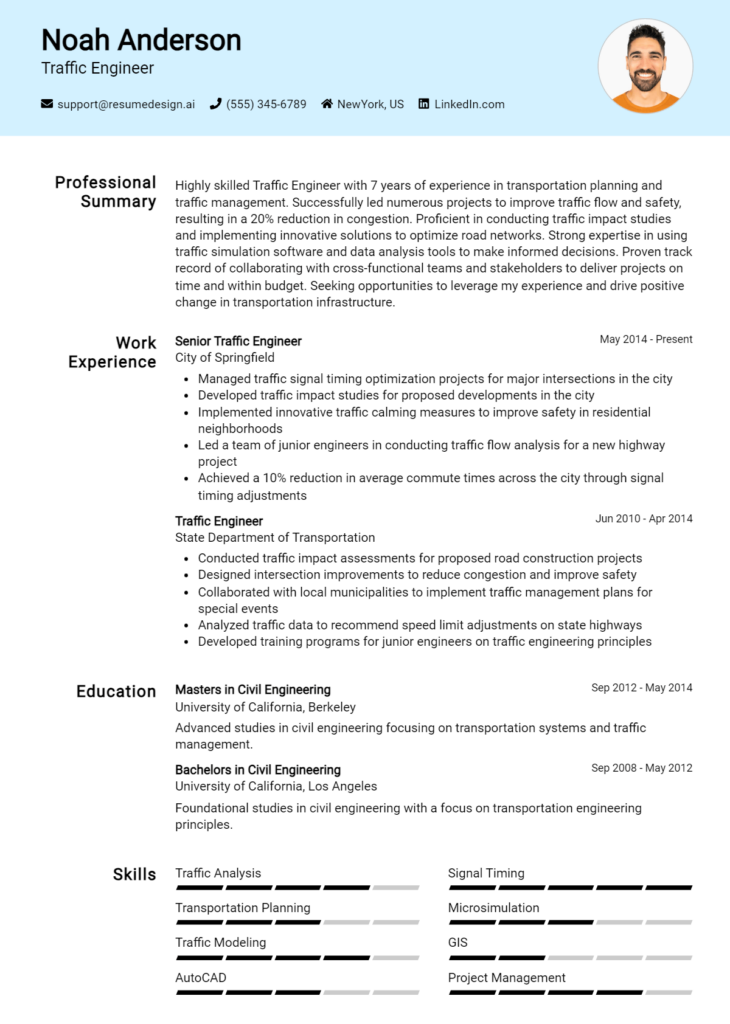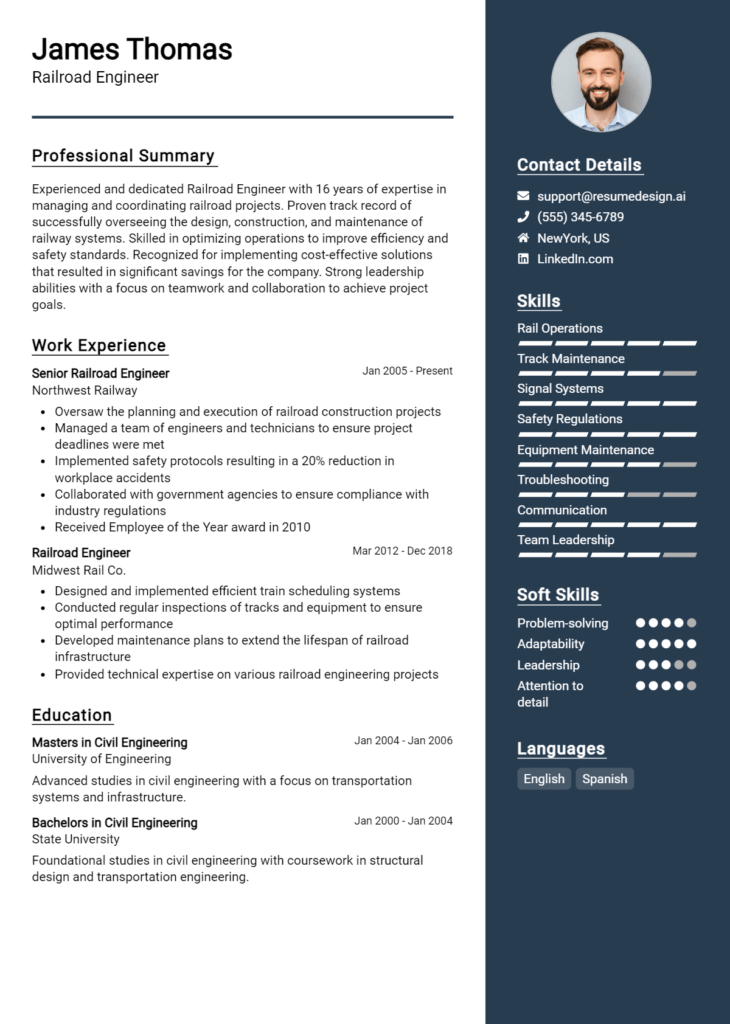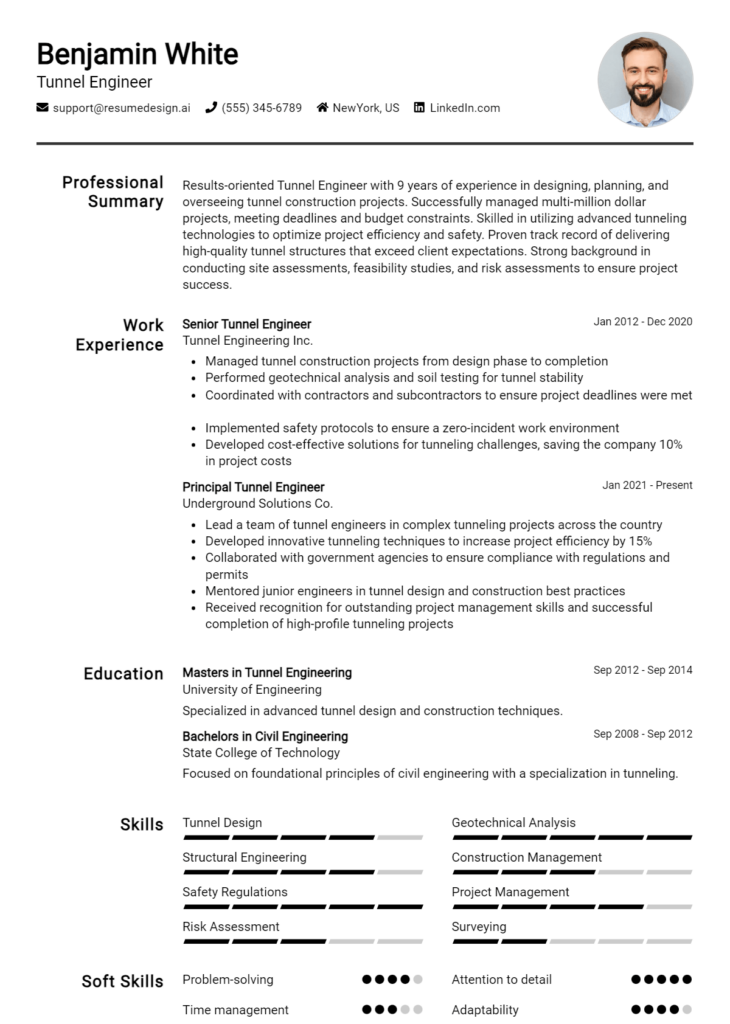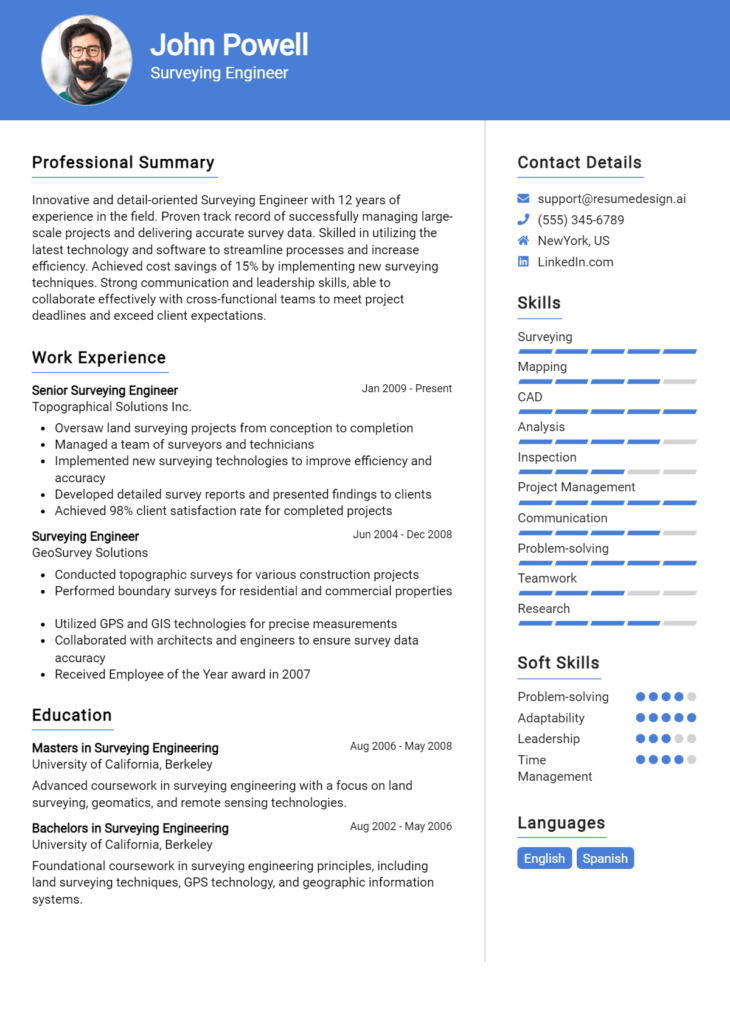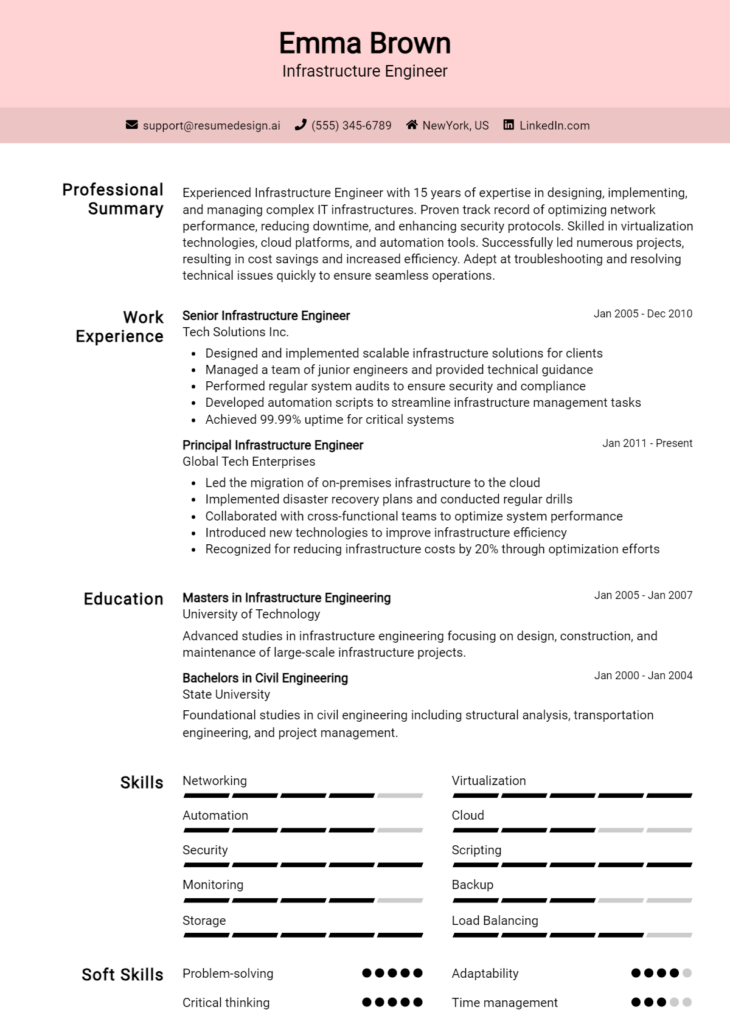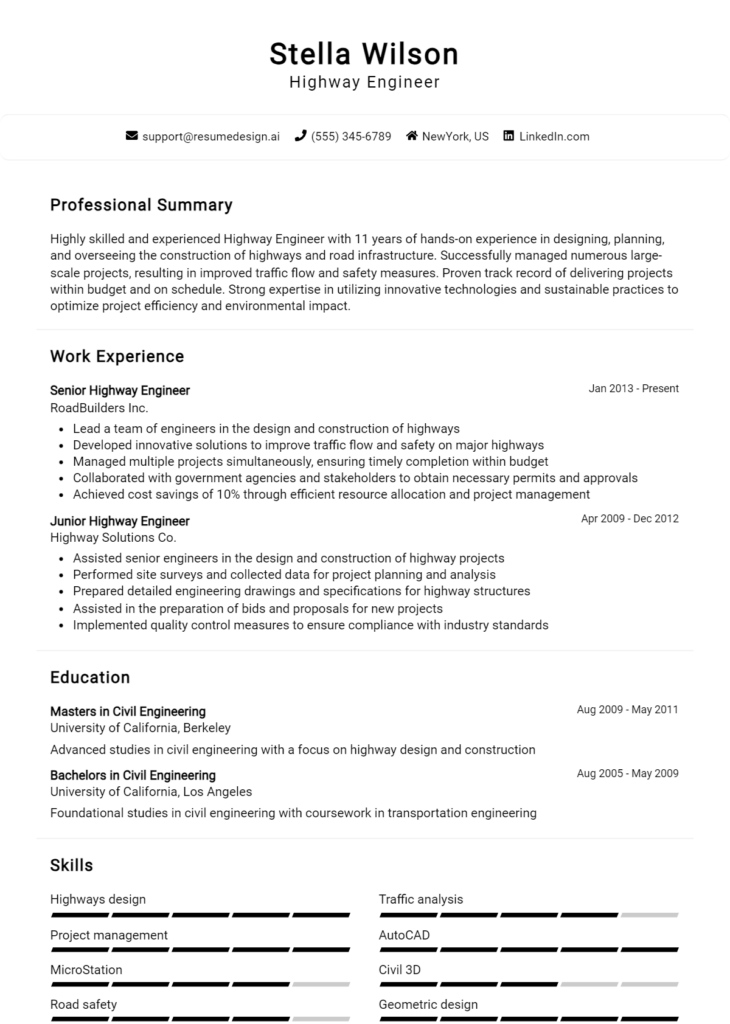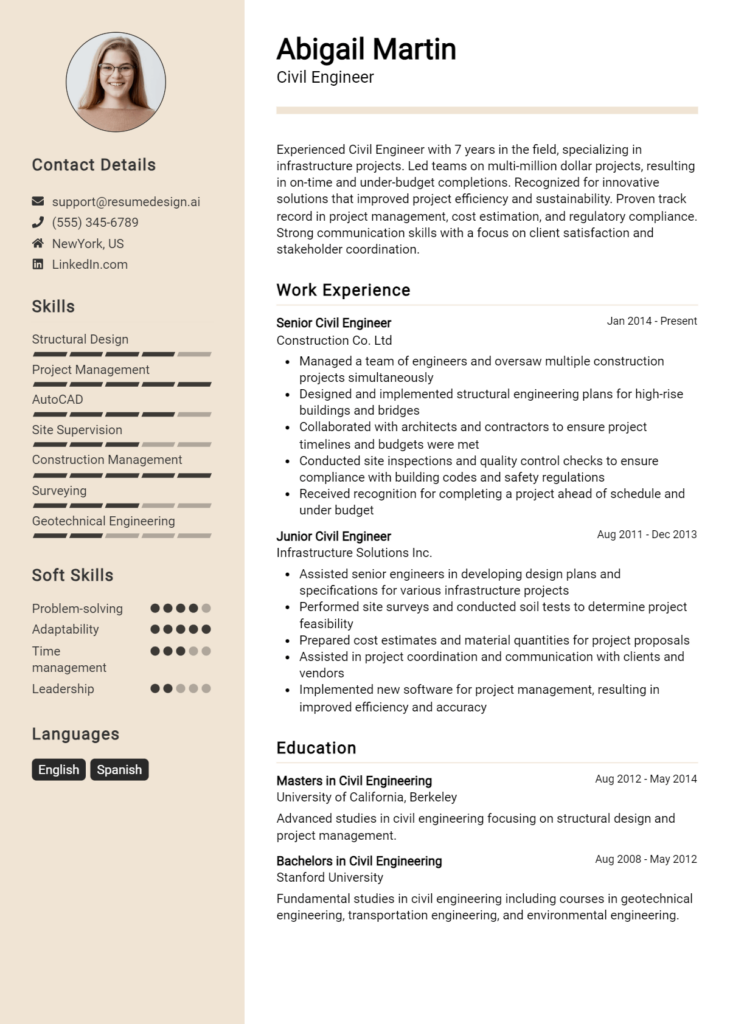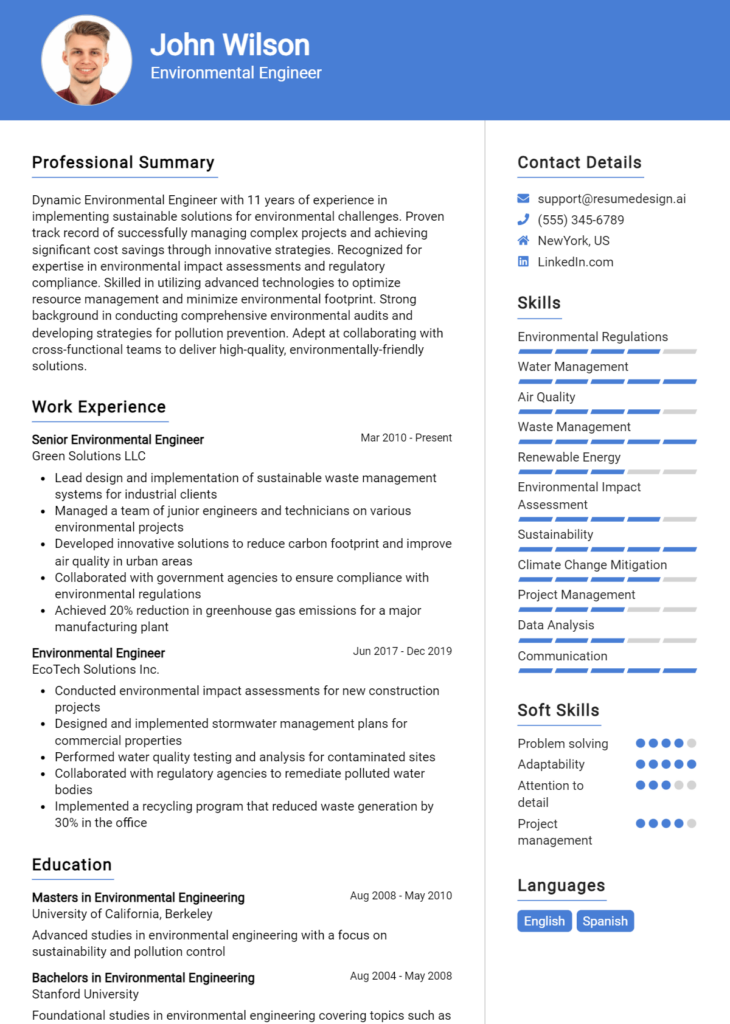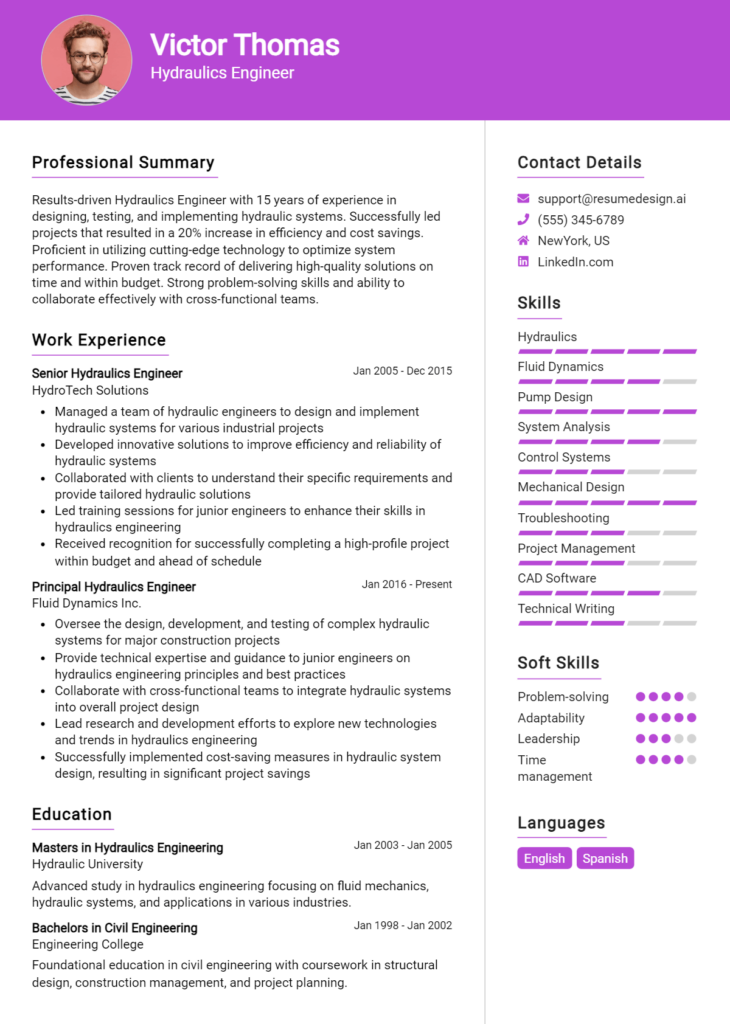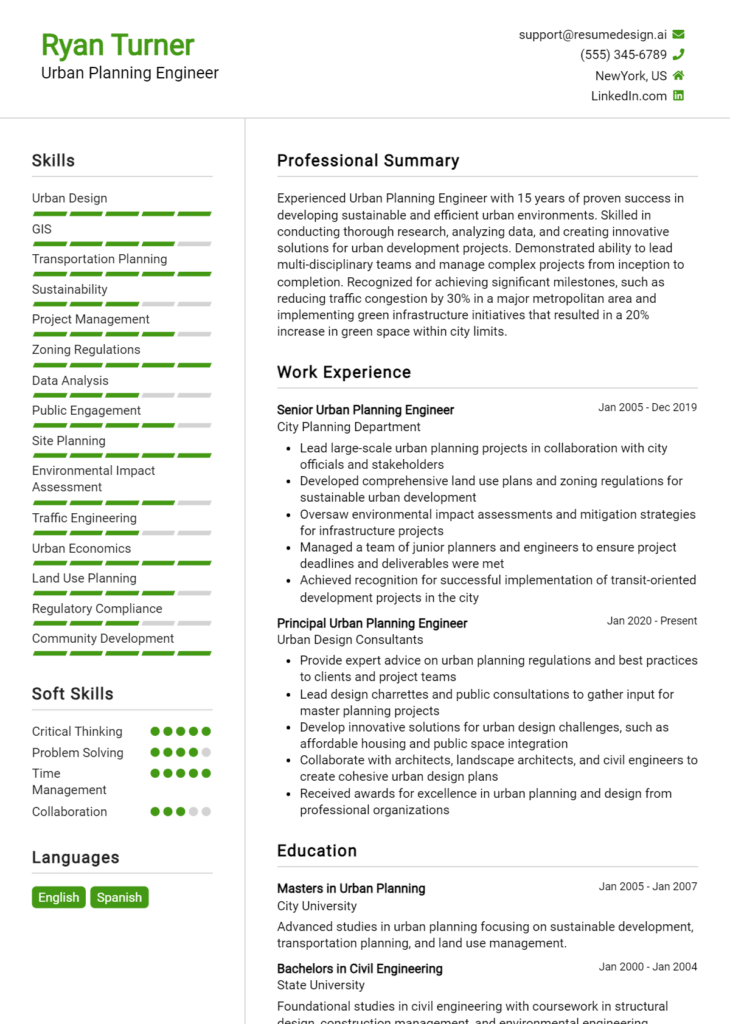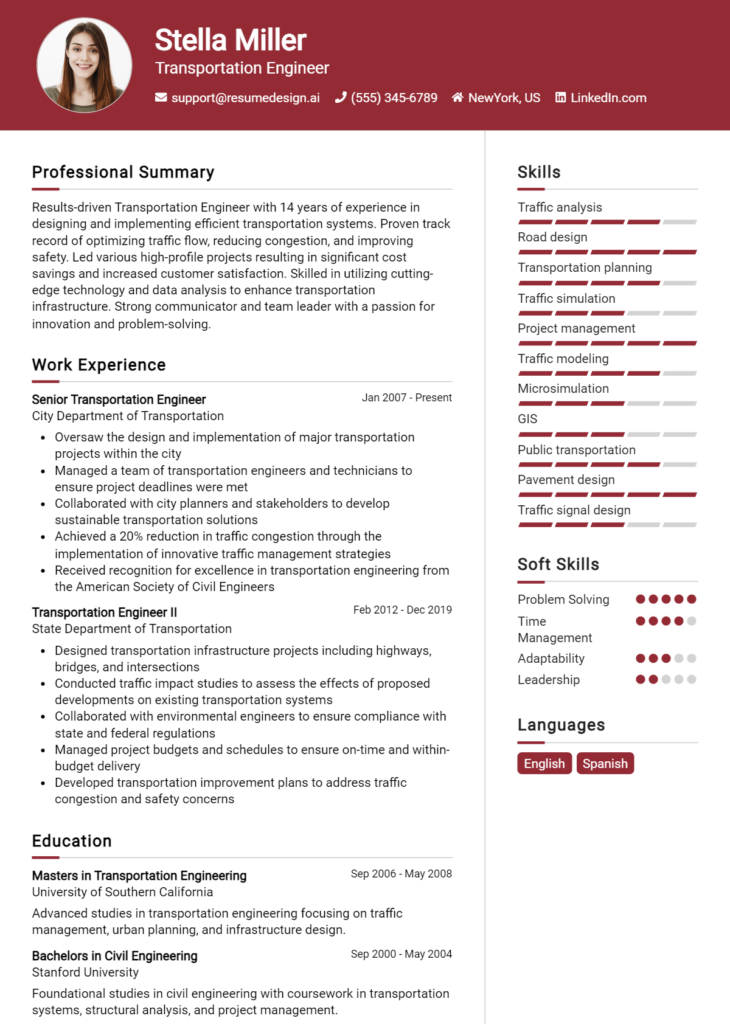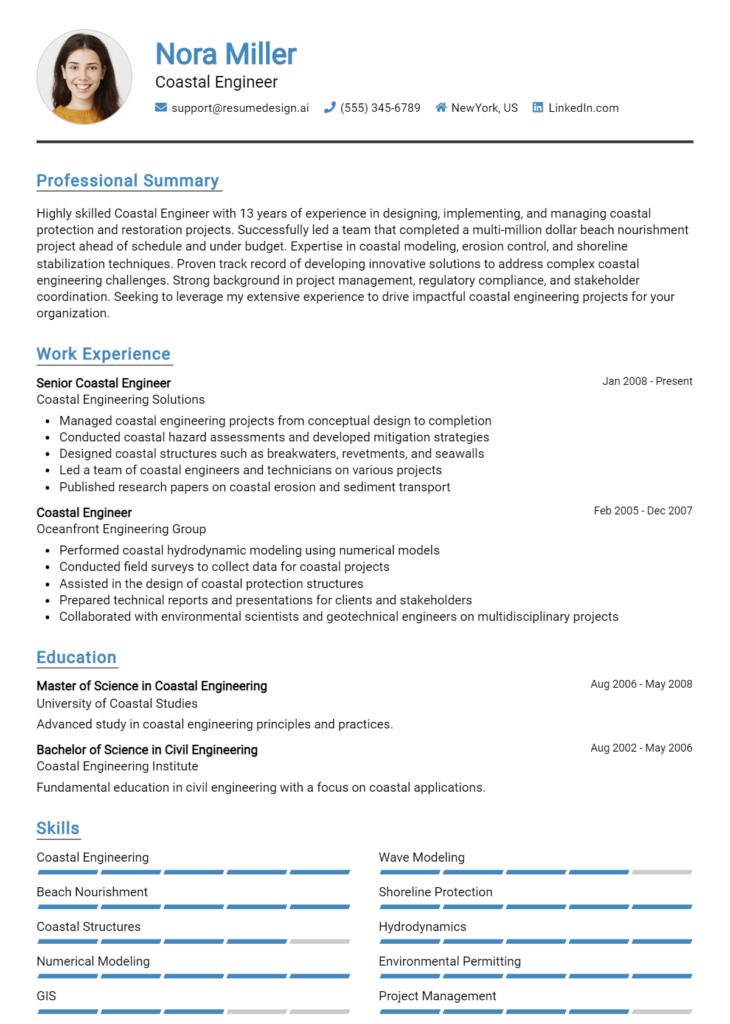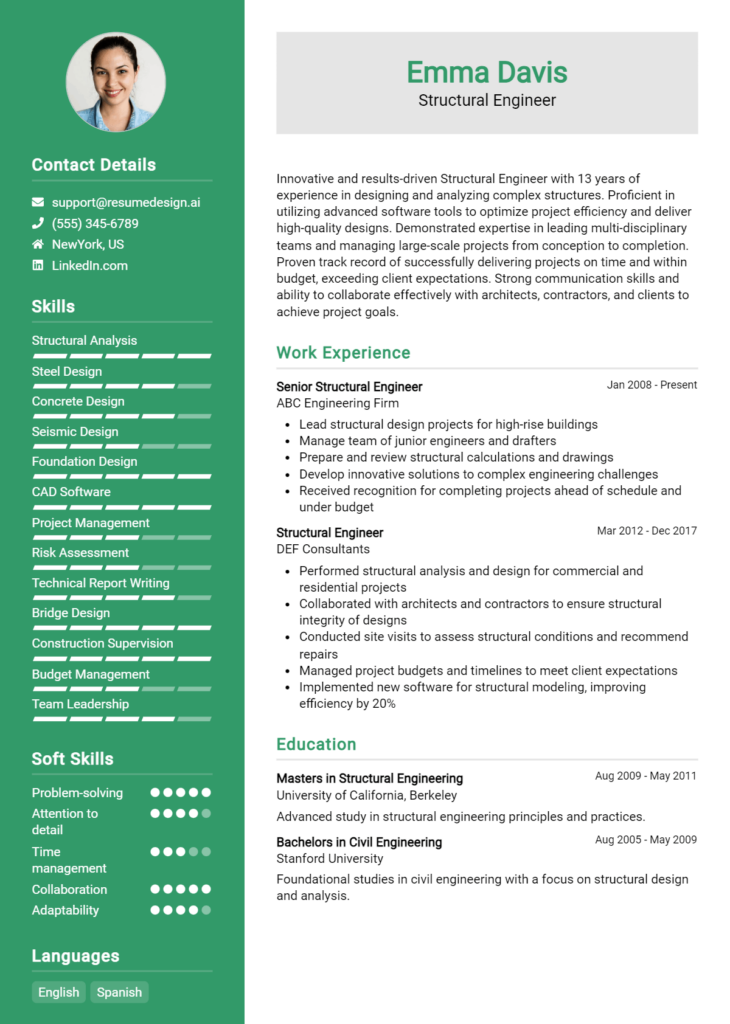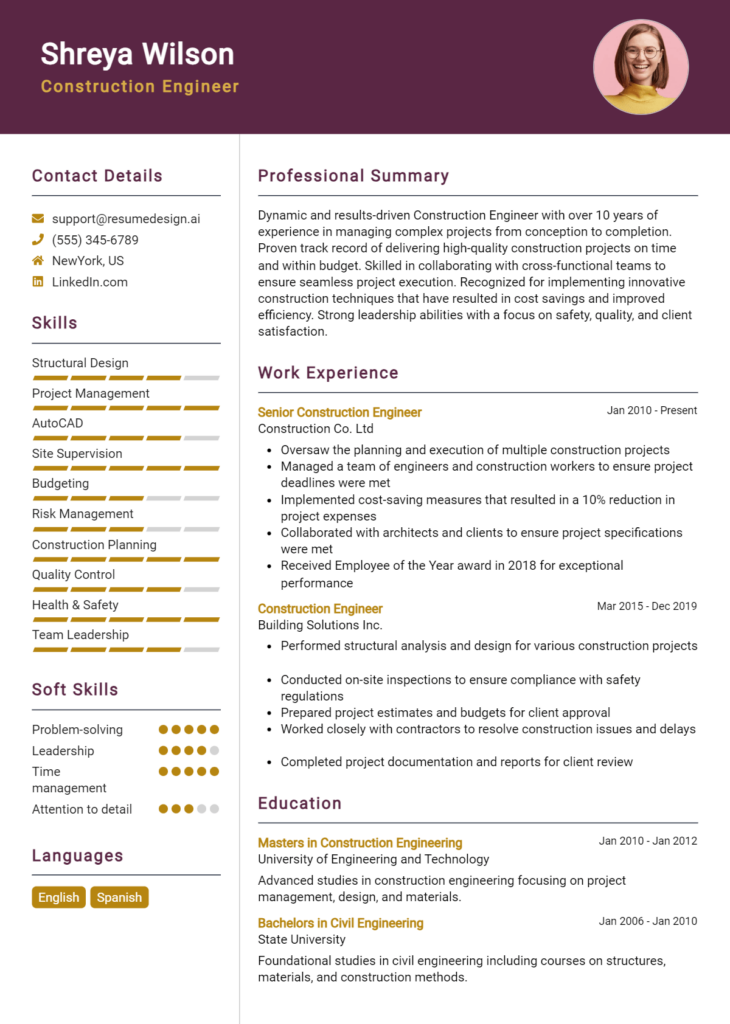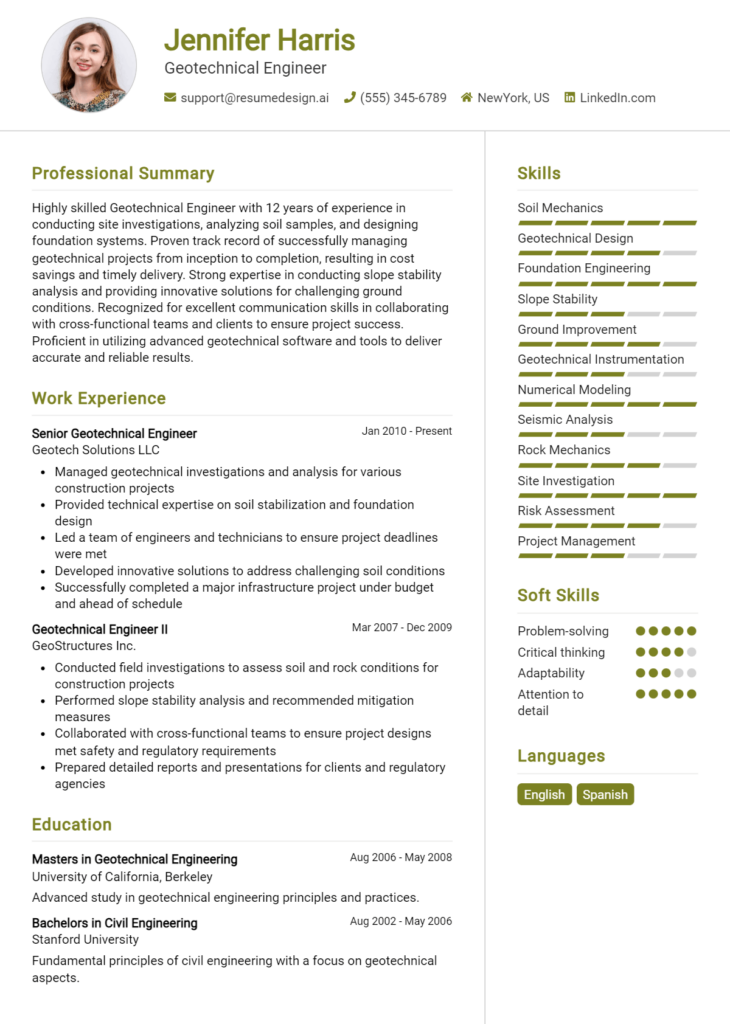Water Resources Engineer Core Responsibilities
A Water Resources Engineer is essential for managing and optimizing water systems, requiring robust technical, operational, and problem-solving skills. They bridge various departments, collaborating with environmental scientists, urban planners, and government agencies to devise sustainable solutions for water management. The role demands proficiency in hydraulic modeling, data analysis, and regulatory compliance, which are vital for achieving organizational goals. A well-structured resume that highlights these competencies can effectively demonstrate a candidate’s qualifications and experience in this critical field.
Common Responsibilities Listed on Water Resources Engineer Resume
- Design and evaluate water resource management systems.
- Conduct hydrological studies and modeling.
- Assess environmental impacts of water projects.
- Develop strategies for flood control and prevention.
- Collaborate with multidisciplinary teams on water-related projects.
- Analyze and interpret data related to water quality and availability.
- Ensure compliance with environmental regulations and permits.
- Prepare technical reports and presentations for stakeholders.
- Implement sustainable practices in water management.
- Monitor and manage water distribution systems.
- Provide expert advice on water resource policies.
- Participate in community outreach and education initiatives.
High-Level Resume Tips for Water Resources Engineer Professionals
In the competitive field of water resources engineering, a well-crafted resume is essential for standing out to potential employers. As the first impression a candidate makes, the resume must effectively showcase a blend of relevant skills, professional achievements, and a clear understanding of industry needs. For water resources engineers, this means highlighting expertise in hydrology, environmental sustainability, and project management. This guide aims to provide actionable resume tips tailored specifically for water resources engineer professionals, ensuring that your resume not only captures attention but also conveys your unique qualifications and contributions to the field.
Top Resume Tips for Water Resources Engineer Professionals
- Tailor your resume to the job description by incorporating keywords and phrases that align with the specific role.
- Highlight relevant experience in water resource management, hydrological modeling, and environmental impact assessments.
- Quantify your achievements with specific metrics, such as project budgets managed, water conservation percentages, or improvements in system efficiency.
- Showcase industry-specific skills, including proficiency in software like AutoCAD, HEC-RAS, and GIS applications.
- Include a section dedicated to certifications relevant to water resources engineering, such as Professional Engineer (PE) or Certified Floodplain Manager (CFM).
- Demonstrate your ability to work collaboratively on cross-disciplinary teams, emphasizing communication and problem-solving skills.
- List professional development activities, such as workshops or conferences attended, to show your commitment to staying current in the field.
- Utilize a clean and professional format to enhance readability, ensuring important information stands out at a glance.
- Incorporate a strong summary statement at the beginning of your resume that encapsulates your career goals and unique value proposition.
By implementing these tips, water resources engineer professionals can significantly enhance their resumes, improving their chances of landing a job in this vital field. A focused and well-structured resume not only showcases your qualifications but also conveys your dedication to addressing the challenges in water resource management, making you a standout candidate in the competitive job market.
Why Resume Headlines & Titles are Important for Water Resources Engineer
Resume headlines and titles play a crucial role in the job application process for Water Resources Engineers. A well-crafted headline can instantly capture the attention of hiring managers, providing a succinct summary of a candidate's key qualifications in a single impactful phrase. It serves as a powerful introduction that sets the tone for the rest of the resume, making it essential for the headline to be concise, relevant, and directly related to the job being applied for. An effective headline not only highlights the candidate's expertise but also enhances their chances of standing out in a competitive field.
Best Practices for Crafting Resume Headlines for Water Resources Engineer
- Keep it concise: Limit your headline to a single, impactful sentence.
- Be specific: Tailor your headline to reflect the specific role of Water Resources Engineer.
- Highlight key skills: Include essential skills relevant to the job, such as hydrology or water quality management.
- Include years of experience: If applicable, mention your years of relevant experience to add credibility.
- Use action words: Start with strong verbs that convey your capabilities, like "Expert," "Skilled," or "Innovative."
- Reflect job requirements: Incorporate keywords from the job description to demonstrate alignment with the position.
- Avoid jargon: Ensure the language is clear and understandable to a broad audience, including HR professionals.
- Make it compelling: Aim for a tone that conveys confidence and enthusiasm for the role.
Example Resume Headlines for Water Resources Engineer
Strong Resume Headlines
Innovative Water Resources Engineer with 10+ Years in Sustainable Water Management
Certified Hydrologist Specializing in Flood Risk Assessment and Mitigation
Experienced Water Resources Engineer with Proven Track Record in Project Management
Dynamic Engineer with Expertise in Water Quality Improvement and Environmental Compliance
Weak Resume Headlines
Water Resources Engineer
Engineer Looking for Opportunities
The strong headlines are effective because they clearly communicate the candidate’s expertise, experience, and specific skills, making them immediately relevant to the hiring manager. They are tailored to the role and provide context around what the candidate can offer. In contrast, the weak headlines fail to impress due to their vagueness and lack of specificity, leaving hiring managers with little insight into the candidate's qualifications or potential contributions to the team.
Writing an Exceptional Water Resources Engineer Resume Summary
A resume summary is a pivotal component for a Water Resources Engineer, acting as a concise introduction that highlights essential skills, experience, and accomplishments. In a competitive job market, hiring managers often spend mere seconds scanning resumes, making a strong summary crucial for capturing their attention. An impactful summary should be tailored to the specific job, showcasing relevant expertise in water resource management, hydrology, and environmental engineering, ensuring that the candidate stands out as a qualified applicant for the role.
Best Practices for Writing a Water Resources Engineer Resume Summary
- Quantify Achievements: Use specific numbers and metrics to illustrate your impact, such as project budgets managed or percentage reductions in water usage.
- Focus on Relevant Skills: Highlight key skills that align with the job description, such as hydraulic modeling, water quality assessment, or regulatory compliance.
- Tailor the Summary: Customize your summary for each job application to reflect the requirements and priorities of the position.
- Keep It Concise: Aim for 3-5 sentences that succinctly convey your professional identity and value proposition.
- Use Action-Oriented Language: Start sentences with strong action verbs to convey confidence and initiative.
- Highlight Certifications: If applicable, mention relevant certifications or licenses, such as Professional Engineer (PE) status.
- Include Industry Experience: Reference years of experience in the water resources field to establish credibility.
- Showcase Problem-Solving Abilities: Mention specific challenges you’ve addressed or innovative solutions you’ve implemented in past roles.
Example Water Resources Engineer Resume Summaries
Strong Resume Summaries
Results-driven Water Resources Engineer with over 7 years of experience in hydraulic modeling and water resource management. Successfully managed projects worth over $2 million, leading to a 25% reduction in water loss for municipal clients by implementing advanced monitoring systems.
Dedicated Water Resources Engineer with expertise in environmental impact assessments and water quality management. Instrumental in developing a stormwater management plan that decreased runoff by 30%, ensuring compliance with state regulations.
Proficient in GIS and water resource optimization, with a track record of enhancing irrigation systems that saved 15% in water usage for agricultural applications. Certified Professional Engineer (PE) with a passion for sustainable water management solutions.
Weak Resume Summaries
Water Resources Engineer with some experience in the field. Interested in solving water-related issues and working on projects.
Experienced engineer looking for a position in water resources. I have a background in engineering and want to help with water management.
The strong resume summaries are effective because they include specific achievements and quantifiable results, showcasing the candidate's value in a clear and tailored manner. They use industry-relevant language and highlight pertinent skills, making them engaging for hiring managers. In contrast, the weak summaries are vague and lack measurable outcomes, failing to convey the candidate's qualifications or relevance to the position, which diminishes their potential impact.
Work Experience Section for Water Resources Engineer Resume
The work experience section of a Water Resources Engineer resume is pivotal in demonstrating a candidate's technical expertise and project management capabilities. This section serves as a platform to highlight not only the specific skills and knowledge acquired through various roles but also the ability to lead teams effectively and deliver high-quality solutions. By quantifying achievements and aligning experience with industry standards, candidates can make a compelling case for their potential contributions to future employers. Presenting concrete examples of successful projects, management responsibilities, and collaborative efforts can significantly enhance the overall impact of the resume.
Best Practices for Water Resources Engineer Work Experience
- Focus on quantifiable outcomes, such as cost savings, efficiency improvements, and successful project completions.
- Highlight specific technical skills relevant to water resources engineering, including software proficiency and design methodologies.
- Demonstrate leadership abilities by detailing experiences in managing teams or projects.
- Include collaborative efforts by mentioning partnerships with stakeholders, governmental agencies, or multidisciplinary teams.
- Align your experiences with industry standards and best practices to show familiarity with current trends.
- Use action verbs to convey responsibility and initiative in your roles.
- Tailor your work experience to the job description, focusing on relevant skills and achievements.
- Keep descriptions concise yet informative, avoiding jargon that may not be understood by all readers.
Example Work Experiences for Water Resources Engineer
Strong Experiences
- Led a team of 5 engineers in the design and implementation of a watershed management plan, resulting in a 30% reduction in flood risk for the local community.
- Developed a water quality monitoring system that improved sampling efficiency by 40%, leading to more accurate compliance with environmental regulations.
- Collaborated with state agencies to secure funding for a $2 million stormwater management project, successfully delivering it 3 months ahead of schedule.
- Implemented GIS technology to optimize water distribution networks, reducing operational costs by 25% and enhancing service delivery.
Weak Experiences
- Worked on various projects related to water resources.
- Assisted in the development of water management plans.
- Participated in team meetings to discuss project updates.
- Helped with data collection and analysis for water quality assessments.
The examples listed as strong experiences are considered effective because they provide specific, quantifiable achievements that demonstrate the candidate's impact and leadership within their roles. They highlight measurable outcomes and showcase the ability to collaborate and innovate in the field. In contrast, the weak experiences lack detail and fail to convey any significant contributions or results, making them less compelling to potential employers.
Top Skills & Keywords for Water Resources Engineer Resume
As a Water Resources Engineer, possessing a diverse set of skills is crucial for effectively managing and conserving water resources. These skills not only enhance your ability to design and implement sustainable water management systems but also demonstrate your readiness to tackle complex challenges in the field. A well-crafted resume that highlights both hard and soft skills can significantly improve your chances of standing out to potential employers. By showcasing your expertise in areas such as hydrology, environmental engineering, and project management, you can illustrate that you are well-equipped to contribute to innovative solutions in water resource management. For further insights into the importance of skills in your resume, you can explore more about skills.
Top Hard & Soft Skills for Water Resources Engineer
Soft Skills
- Problem-solving
- Communication
- Team collaboration
- Critical thinking
- Adaptability
- Time management
- Attention to detail
- Leadership
- Project management
- Interpersonal skills
- Negotiation
- Creativity
- Conflict resolution
- Decision-making
- Empathy
Hard Skills
- Hydrologic modeling
- Water quality analysis
- Geographic Information Systems (GIS)
- Civil engineering principles
- Environmental impact assessment
- Data analysis and interpretation
- Computer-aided design (CAD)
- Regulatory compliance knowledge
- Pump and pipeline design
- Stormwater management
- Groundwater assessment
- Irrigation systems design
- Water resource planning
- Statistical analysis
- Construction management
- Soil and sediment transport analysis
Emphasizing both your soft and hard skills in your resume will not only reflect your technical competence but also your ability to work effectively in a team-oriented environment. For guidance on how to effectively present your work experience in conjunction with your skills, consider tailoring your resume to highlight relevant projects and achievements that align with the job requirements.
Stand Out with a Winning Water Resources Engineer Cover Letter
I am writing to express my interest in the Water Resources Engineer position at [Company Name], as advertised on [Job Board/Company Website]. With a Master's degree in Civil Engineering and over five years of experience specializing in hydrology and water management systems, I am excited about the opportunity to contribute to your team. My background in designing sustainable water resources solutions and my commitment to advancing environmental stewardship align perfectly with your company’s mission to promote responsible water usage and management.
In my previous role at [Previous Company Name], I successfully led a team in developing a comprehensive water conservation plan that reduced water waste by 30% over three years. This initiative involved meticulous data analysis, stakeholder engagement, and the integration of innovative technologies to enhance water efficiency. My proficiency in hydraulic modeling software, complemented by my hands-on experience with field surveys and water quality testing, has equipped me with the tools necessary to tackle complex water resource challenges effectively.
I am particularly drawn to the projects at [Company Name] that focus on sustainable practices and community engagement. I admire your commitment to developing resilient water systems in the face of climate change and population growth. I am eager to bring my skills in project management and interdisciplinary collaboration to your team, ensuring that our solutions not only meet regulatory standards but also serve the greater good of the communities we support.
Thank you for considering my application. I am looking forward to the opportunity to discuss how my expertise in water resources engineering can contribute to the ongoing success of [Company Name]. Please feel free to contact me at your convenience to schedule a conversation.
Common Mistakes to Avoid in a Water Resources Engineer Resume
When crafting a resume for a Water Resources Engineer position, it's crucial to present your skills and experiences effectively. Many candidates make common mistakes that could hinder their chances of landing an interview. By avoiding these pitfalls, you can enhance your resume's impact and better showcase your qualifications. Here are some common mistakes to watch out for:
Lack of Specificity: Vague descriptions can dilute your accomplishments. Instead of simply stating responsibilities, use specific metrics and outcomes to highlight your contributions, such as “designed a flood control system that reduced overflow incidents by 30%.”
Ignoring Keywords: Many employers use Applicant Tracking Systems (ATS) to screen resumes. Failing to include relevant industry keywords can result in your resume being overlooked. Tailor your resume to match the job description by incorporating specific terms related to water resources engineering.
Overloading with Technical Jargon: While it's important to demonstrate your technical knowledge, using excessive jargon can alienate non-technical reviewers. Aim for a balance by explaining complex concepts in simpler terms when possible.
Neglecting Soft Skills: Water resources engineers often work in teams and with stakeholders. Omitting soft skills like communication, teamwork, and problem-solving could overlook important aspects of your candidacy. Include examples that showcase these skills in action.
Unorganized Layout: A cluttered or poorly structured resume can be difficult to read. Use clear headings, bullet points, and consistent formatting to enhance readability and ensure that key information stands out.
Excessive Length: Resumes that are too long can lead to important information being missed. Aim for a concise document, ideally one page for early career professionals and two pages for those with more experience, focusing on the most relevant information.
Lack of Tailoring for Each Application: Sending the same resume for multiple job applications can weaken your chances. Customize your resume for each position by aligning your experiences and skills with the specific requirements of the job.
Inadequate Education Detail: For technical roles like water resources engineering, your education is critical. Omitting relevant coursework, certifications, or projects can undermine your qualifications. Ensure you highlight all pertinent educational achievements.
Conclusion
As a Water Resources Engineer, your role is crucial in managing and optimizing the use of water resources, ensuring sustainable practices, and addressing environmental challenges. Throughout this article, we have explored the various responsibilities of a Water Resources Engineer, including designing hydraulic structures, conducting hydrological modeling, and collaborating with government agencies and stakeholders.
Additionally, we discussed the importance of staying updated with the latest technologies and regulations in water management to enhance your effectiveness in the field. Moreover, the need for strong analytical skills, problem-solving abilities, and effective communication is vital for success in this profession.
In conclusion, if you are looking to advance your career as a Water Resources Engineer or simply want to ensure that your resume reflects your skills and experiences accurately, now is the time to take action. Review your resume and consider utilizing resources such as resume templates, resume builder, resume examples, and cover letter templates. These tools can help you create a polished and professional presentation of your qualifications, setting you apart in a competitive job market. Don't miss the opportunity to make a strong impression—revamp your resume today!

